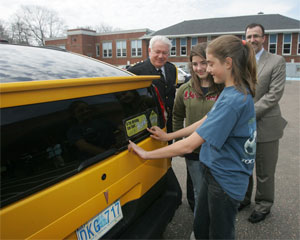 |
| Halifax Regional Police Chief Frank Beazley (left) and Don Forgeron of Canada’s home, car and business insurers, watch as two students from LeMarchant St. Thomas School afix a Pace Car emblem to the back of a vehicle. (Photo courtesy of the Insurance Bureau of Canada) |
A pioneering program gets a boost next week when Dalhousie students go door-to-door to sign up local residents for the Pace Car Program.
A community-based initiative, the program asks drivers to sign the Pace Car pledge to drive at the posted 50-kilometre speed limit. Cars then become “mobile speed bumps,” slowing the traffic behind them. Drivers also agree to be more aware and courteous towards pedestrians and cyclists.
The free, volunteer project is a partnership between Active and Safe Routes to School and Canada’s home, car and business insurers. Active and Safe Routes to School (under the umbrella of the Ecology Action Centre) has joined forces with the University Neighborhood Watch Association, Dalhousie and the University of King’s College to bring the program to the surrounding neighbourhood.
It’s the first time Dal and King’s, under the auspices of the Dalhousie University Community Committee (DUCC), have become involved in a neighborhood program of this kind.
“I believe the Pace Car project is a great opportunity for students, faculty and staff of Dalhousie to contribute to a project that is aimed at enhancing the quality of living in the surrounding residential neighbourhood,” says DUCC Co-Chair Larry Maloney, Associate Vice-President, Academic.
 |
| Graph to show pedestrian fatalities based on vehicle speed. (Source: Killing Speed and Saving Lives) |
Cheyenne Dickinson, Community Advisor, Active & Safe Routes to School, is excited about the prospect of such a comprehensive partnership.
“The Pace Car program is all about neighbours working together to take back the streets in their community, so the partnership among Dalhousie, King’s and the University Neighbourhood Watch Association couldn’t be more perfect,” says Ms. Dickinson.
One of the big challenges for the program is making sure people know it exists, says Dr. Maloney. Under the wing of DUCC, Dalhousie will send students into a test area – the streets bordered by Coburg, Robie, Jubilee and Oxford – to sign up neighbours and students.
Dalhousie also will place sign-up cards and drop boxes on all three campuses – Studley, Carleton and Sexton — as well as at the University of King’s College. Those will be available as of Wednesday, Oct. 17 in five locations:
- The Student Service Centre, Sexton
- Tupper Link, Carleton Campus
- SUB, Studley Campus
- Room 218, Communicationws and Marketing, Henry Hicks, Studley
Campus - The main reception area, Administration Building, University of King’s College.
People who work or study on campus and drive through any of the neighbourhood streets – Oxford, Robie, Coburg, Jubilee, Seymour, Chestnut, Larch, Walnut, Edward, etc. – should consider signing a pledge card.
Once a card is signed and put in the box, it will be collected and material sent in the mail. These include “clings,” which stick on the back of a vehicle. The cling indicates a vehicle is officially a Pace Car.
Comments
comments powered by Disqus
